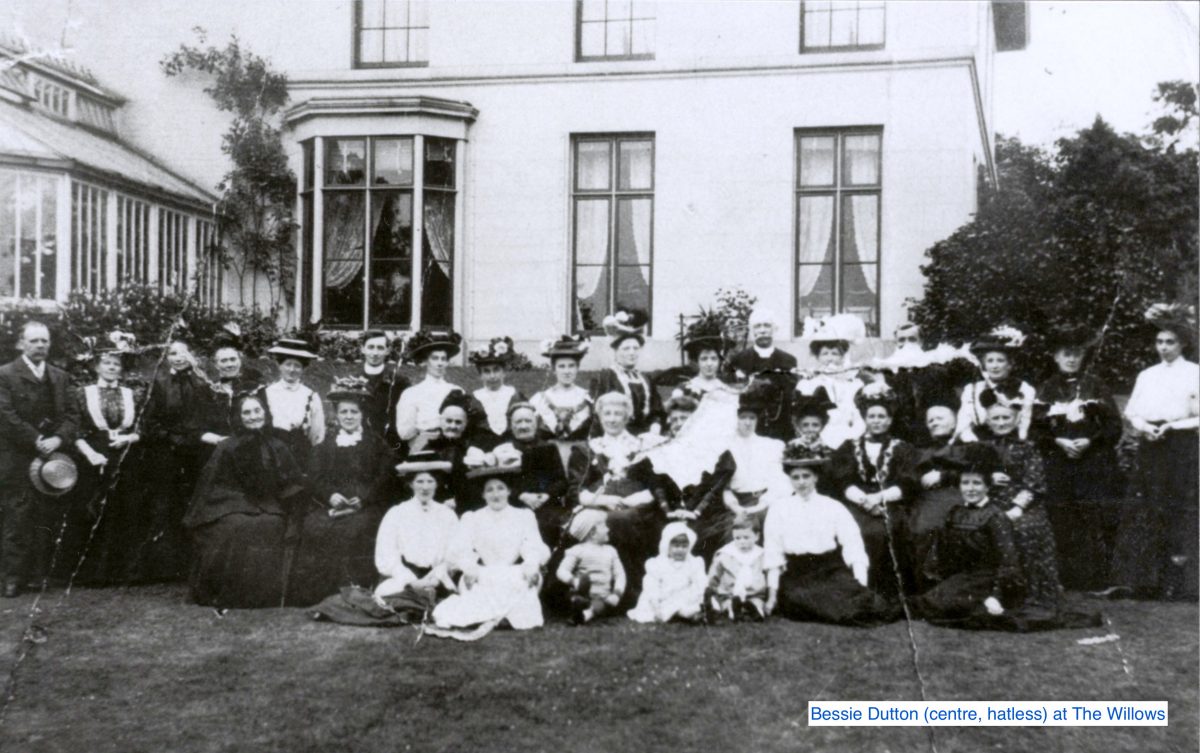
Elizabeth (Bessie) Dutton was born on 8 November 1847. She was baptised on 10 February 1848 at St Peter’s, Liverpool. Her parents were Daniel (initially a grocer and tea dealer, but later a cabinet maker employing over 60 men, women and boys) and Elizabeth. Her grandfather and uncles farmed in Norton and later at Mosside, between the River Mersey and the Manchester Ship Canal.
She was brought up in Liverpool and lived there until her brother, Thomas Nixon Dutton, bought ‘The Willows’ in Moore for her in 1882, for the sum of £2100. She lived there ‘on her own means’, looked after by a cook and housekeeper, until she died on 21 November 1919, aged 72 years.

A mahogany plaque on the wall of Moore Methodist Chapel was erected to commemorate her and said, simply, that
‘she went about doing good’
But what made her extraordinary? She was described as being of outstanding character, academically and spiritually gifted and was physically very tall – said to be over 6′. Bessie herself was a poet, an artist and a lover of nature. Additionally, she was a great correspondent, writing thousands of letters ‘full of the spirit of charity and goodness’. Sadly, none remain.
The memorial plaque had the inscription ‘In affectionate remembrance of Miss Bessie Dutton, who, for many years was a faithful and devoted servant of Christ in this church and district’. Her obituary gives us more details. She worked with the
Wesleyan Church
British Women’s Temperance Association
Railway Mission (whose objective was the moral and spiritual advancement of railway employees)
Police Christian Mission
Bible Society
Women’s Liberal Association (involved in the fight for women’s suffrage)
Band of Hope Union (an organisation for children under 16, with the aim of preventing them from starting to drink alcohol)
It was said at her funeral that she loved her Sunday School work the most, leading classes in both Moore and Warrington. Some accounts say that she worked mainly with the older girls who held her in great esteem. She led her class with ‘loving but persistent teaching and advice’.
The Rev EH Jackson recalled that she used the train, but when the times were inconvenient she would either walk home from Warrington or wait for the late train, rather than finishing her class early. As she approached 60, she was still to be seen walking home, tired but happy.
The schoolroom in Moore Chapel was extended in 1900. Bessie laid a memorial stone and received a bible and hymn book as a token of thanks. When it was complete, she officially reopened the schoolroom. The ceremony was followed by a celebratory tea for 130 people.
Moore Methodist Chapel was opened in 1812, although groups of people had been meeting at Acton Grange (probably Hollyhedge Farm) for some years before this. By the 1860’s the building required extensive repair and the decision was taken to rebuild it. Bessie’s uncles paid for the new building, her father donated the communion table (and may well have made it himself) and she donated the sacramental service. This was the same one that was used until the chapel closed in 2004.
Bessie had a much loved nephew, Lieutenant Colonel Egerton Fairclough. He commanded forces in the South Lancashire Regiment. He was killed in action on 10 April 1918, aged just 33 years. That marked a turning point in her life. It was said that she loved him as if he had been her son. She was deeply upset by the war and her sympathy went out to all those who were lost.
Bessie died on 21November 1919. Her funeral was held in Moore Methodist Chapel. Blinds were drawn in the village and ‘sorrowing spectators’ gathered around the chapel. She had inspired love and respect in all with whom she came into contact and worked tirelessly for their well being.
